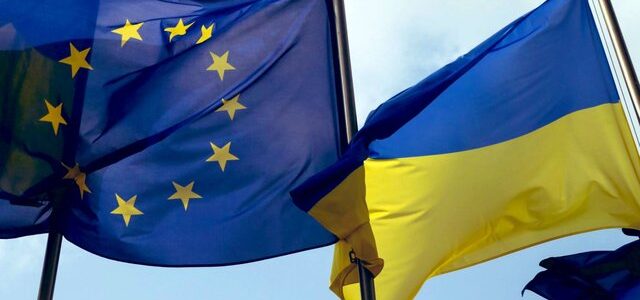
The EU says that the negotiations on Ukraine’s accession to the European Union will be rigorous and demanding, and that it will be up to EU member states to decide whether all the conditions for completion have been met.
“The accession negotiations that we are starting today will be rigorous and demanding. Thanks to your determination and commitment, we are confident in your ability to bring this process to a successful conclusion. We will support you in your efforts, and we look forward to welcoming you as a fully-fledged member of the European Union,” said Hajia Labib, Minister of Foreign Affairs of Belgium, which holds the EU presidency, at the opening of the Intergovernmental Conference in Luxembourg on Tuesday, marking the start of official negotiations on Ukraine’s accession to the EU.
She clarified that it is the EU member states that will decide whether the conditions for completing the negotiations have been met, taking into account changes in EU legislation since the opening of the negotiations and Ukraine’s readiness for membership.
Presenting the approved framework for the negotiations, the Minister said that it is based on “taking into account the experience of past enlargements and ongoing accession negotiations, as well as EU legislation, and properly reflects Ukraine’s advantages and characteristics.” “The negotiations are aimed at ensuring that Ukraine fully adopts EU norms and ensures their full implementation and compliance. The negotiations also include a revised enlargement methodology, which ensures an even greater focus on fundamental reforms in the accession negotiations. Therefore, Ukraine will need to fully adopt and continue to implement reforms in the areas of rule of law and fundamental freedoms, strengthening democratic institutions and public administration reforms, as well as economic criteria,” the Minister elaborated.
In addition, Ukraine will need to pay special attention to judicial reform, the fight against corruption, and the protection and non-discriminatory treatment of persons belonging to national minorities. “To ensure that progress in these areas is irreversible and fully and effectively implemented, progress will be closely monitored by the Commission, which will report regularly to the Council,” Labib said.
According to her, “the progress in the implementation of the fundamental cluster (the cluster on fundamental values) will be crucial throughout the process of these reforms, which will determine the overall pace of the negotiations.” “This will give enough time to create the necessary legislation, institutions, and a solid track record of implementation before the end of the negotiations. The screening reports to be prepared by the Commission will contain substantial recommendations, in particular on the tasks to be addressed in the roadmaps adopted by the Ukrainian authorities,” the minister added.
At the same time, Labib expressed the expectation that Ukraine, as a future member state, will adhere to EU values, “namely, respect for human dignity, freedoms, democracy, equality, the rule of law, the rule of law and respect for human rights, including the rights of individuals to belong to minorities.” “In addition, accession to the EU provides for the timely and effective implementation of all EU legislation or the EU acquis as it existed at the time of accession. In accordance with the revised enlargement methodology, the development of sufficient administrative and judicial capacity, as part of the fundamental cluster, is key to fulfilling all the obligations arising from membership. Good neighborly relations with EU member states and other enlargement partners remain important,” she said.
The minister said that the EU welcomes “Ukraine’s strategic commitment to its EU path and its high coherence with the EU’s common foreign and security policy and its restrictive measures”. “We encourage Ukraine to continue this positive trend towards full coherence, in line with respect for the principles of sovereignty and territorial integrity, including for EU members. Coherence with the EU’s foreign and security policy is a key aspect of the EU integration process and a clear expression of a strategic choice.”
In addition, according to Labib, in parallel to the accession negotiations, the Union and Ukraine will continue their dialogue with civil society and cultural cooperation in order to “bring people closer together and ensure that citizens support the accession process.” “We expect Ukraine to continue to strategically communicate the benefits and commitments of the accession process and EU membership to its public, including by combating disinformation,” she said.